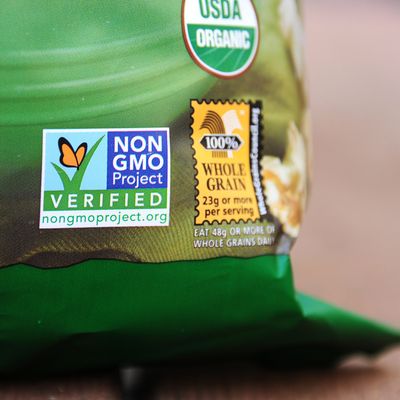
Many state legislators have tried, but none have succeeded in passing bills to mandate the labeling of genetically modified foods. In October, Californians voted against Proposition 37, and on Thursday, the U.S. Senate rejected an amendment that would have explicitly allowed states to decide to require labeling. But although this may be a federal issue, that isn’t stopping Democratic State Assemblywoman Linda Rosenthal and Republican State Senator Kenneth LaValle from sponsoring bills that would require the labeling of genetically modified foods sold in New York.
So why has it been so damn hard to pass legislation? Labeling hurts massive biotech companies like Monsanto that have spent millions opposing proposed laws. They’re worried, for obvious reasons, that these labels could become Scarlet Letters, and scare customers away from items that the Food and Drug Administration (which only supports voluntary labeling) deems safe.
Monsanto’s become the big, bad enemy: Last week, the U.S. Senate prevented overturning the “Monsanto Protection Act,” which is a small section of a bill that allows companies to develop and sell genetically modified products, even if legal action is taken against them and the products are deemed unhealthy. In response, hundreds of thousands of people (in 52 countries!) joined the “March Against Monsanto” protest this past Saturday.
Passing legislation is made even more complicated by the fact that the risks and benefits of genetically modified foods are still up for debate. “Breeding the Nutrition Out of Food,” a Times article that ran on Sunday, reports that over time, we’ve reduced corn’s nutrients and added sugar and starch. But billionaires like Bill Gates are donating millions to biotechnology labs so that genetically modified seeds can bolster crop production and help feed people in developing countries. And Monsanto, obviously, calls its food “safe.”
Customers, of course, want the right to know what’s in their food — and transparent labeling can only help educate and empower them. To meet the demands of its clientele (read: boost sales), Whole Foods recently decided to label all of its genetically modified foods. It’s a strategic move that could make labeling seem more mainstream.
Public and political opinions are changing: Vermont and Connecticut are joining New York in moving ahead with proposals, and 64 countries already require labeling. It’s going to be an uphill battle for legislators, and it may not even be up to the states to decide this issue. But Michael Pollan thinks it’s only a matter of time before these labels become the norm in America.
“They’re spending so much money to fight soda taxes, and it’s the same with labeling genetically modified food,” Pollan told Adam Platt last month. “But these things are coming. It takes a lot of battles before you win one. But once you win one, you win them all.” Could New York pave the way?
Monsanto: New York Legislature considers bill requiring labels for genetically modified food [NYDN]
GMO Labeling Bill Voted Down In Senate [HuffPo]
Monsanto, DuPont Spending Millions to Oppose California’s GMO Labeling Law [Forbes]
Rejection Of Bill To Label Genetically Modified Foods Sparks Global Protest Against Biotech Giant Monsanto [Opposing Views]
Breeding the Nutrition Out of Our Food [NYT]
Earlier: Proposition 37 Defeated By 53% of California Voters
Billionaires Give Millions to Provide Farmers With Genetically Modified Seeds
Whole Foods to Label All Genetically Modified Foods
In Conversation: Michael Pollan and Adam Platt




